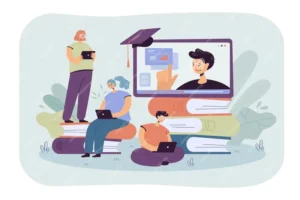Building Virtual Communities: A Key Component of Online Education

Online education has revolutionized the way people access learning opportunities. From traditional universities to specialized online platforms, millions of students worldwide now have access to a vast array of educational resources. While the convenience of online learning is undeniable, there is a growing recognition of the importance of building virtual communities to enhance the educational experience. These communities serve as a vital component of online education, fostering engagement, collaboration, and a sense of belonging among learners.
Contents
The Significance of Virtual Communities
Virtual communities in the context of online education refer to digital spaces where students, instructors, and even experts can interact, share knowledge, and collaborate. They have become instrumental in bridging the gap between the physical absence of a traditional classroom and the diverse, geographically dispersed student body in the digital realm.
- Fostering Engagement: One of the challenges of online education is maintaining student engagement. Virtual communities offer a platform for students to actively participate in discussions, debates, and collaborative projects, keeping them deeply involved in their learning journey.
- Peer Support: Building relationships with peers is a critical aspect of education. Virtual communities create opportunities for students to connect, offer support, and share their experiences, making the learning process less isolated.
- Diversity of Perspectives: Online learners often come from diverse backgrounds and cultures. Interacting with peers who offer unique perspectives enriches the learning experience and promotes cultural understanding.
- Professional Networking: Beyond academic benefits, virtual communities facilitate professional networking. Students can connect with experts and industry professionals, opening doors to potential career opportunities.
- Immediate Feedback: Social interaction within virtual communities allows students to receive prompt feedback from both instructors and peers. This timely input helps learners correct misunderstandings and refine their understanding of course material.
- Collaborative Learning: Collaborative projects and group activities within virtual communities encourage teamwork and problem-solving skills. These skills are highly transferable to real-world scenarios.
- Mentorship: Many virtual communities offer mentorship programs where experienced individuals guide and support less-experienced learners, providing invaluable insights and advice.
- Socioemotional Support: Online education can sometimes feel isolating. Virtual communities provide socioemotional support, ensuring that students feel heard, valued, and connected during their educational journey.
Examples of Successful Virtual Learning Communities
- Discussion Forums: Common in online courses, discussion forums serve as platforms for students to ask questions, engage in debates, and share resources.
- Social Media Groups: Many educational institutions and online courses create dedicated social media groups where students and educators can interact, share updates, and seek assistance.
- Professional Networking Sites: Platforms like LinkedIn offer groups focused on specific industries or areas of interest, allowing students to connect with professionals in their field.
- Online Tutoring Communities: Some virtual communities specialize in providing tutoring and academic support to students in need.
Conclusion
Virtual communities play a pivotal role in the success of online education. They provide a sense of belonging, foster engagement, and promote collaborative learning. As online education continues to evolve, the role of virtual communities in creating vibrant learning environments will only become more critical. It is through these interactions that students develop not only academically but also personally and professionally. Therefore, educators and institutions must invest in and prioritize the development of these valuable online communities to enhance the educational experience and prepare students for the challenges of the future.









